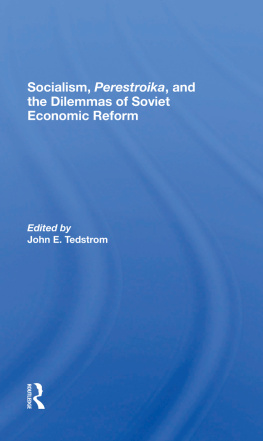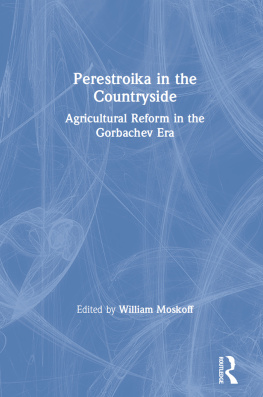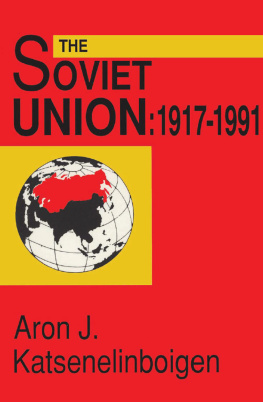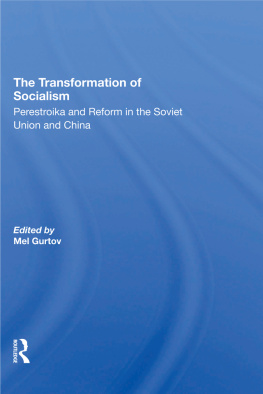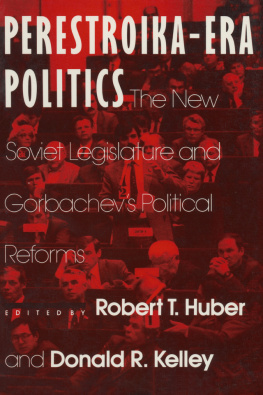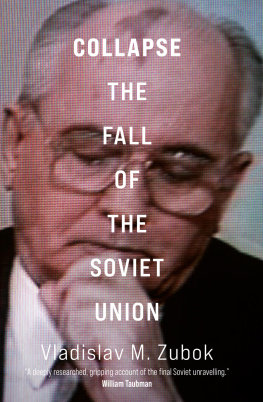First published 1989 by Westview Press, Inc.
Published 2019 by Routledge
52 Vanderbilt Avenue, New York, NY 10017
2 Park Square, Milton Park, Abingdon, Oxon OX14 4RN
Routledge is an imprint of the Taylor & Francis Group, an informa business
Copyright 1989 Taylor & Francis
All rights reserved. No part of this book may be reprinted or reproduced or utilised in any form or by any electronic, mechanical, or other means, now known or hereafter invented, including photocopying and recording, or in any information storage or retrieval system, without permission in writing from the publishers.
Notice:
Product or corporate names may be trademarks or registered trademarks, and are used only for identification and explanation without intent to infringe.
Library of Congress Cataloging-in-Publication Data
Balzer, Harley D.
Soviet science on the edge of reform / Harley D. Balzer; with an
appendix by Stephen Sternheimer.
p. cm.(Westview special studies on the Soviet Union and
Eastern Europe)
Includes bibliographical references (p. ).
ISBN 0-8133-7741-2
1. ScienceStudy and teachingSoviet Union. 2. Engineering
Study and teachingSoviet Union. 3. ResearchSoviet Union.
4. EngineeringResearchSoviet Union. I. Sternheimer, Stephen.
II. Title. III. Series.
Q183.4.S494B35 1989
338.94706dc20 89-27247
CIP
ISBN 13: 978-0-367-28838-9 (hbk)
It is my sincere hope that the reforms currently being introduced in the USSR will render much of this book obsolete. Yet, even if perestroika brings significant change to the Soviet Union, historians will want a record of what existed before. After four years, it has become apparent that perestroika is a painful long-term process. In such a large and diverse country, even the reforms that are successful cannot take place everywhere at once. One major goal in publishing this book is to make data from a major interview project on Soviet science and technology available to a broader audience. Despite the changes taking place, many of the features illuminated by these unique data persist.
Other characterizations of the situation in Soviet science presented here have been superseded by glasnost'- inspired revelations in the Soviet press. Scholarship, however, moves more slowly, and most Soviet researchers have been more cautious than the journalists and memoirists in exploring "blank spots." Data from this interview project may provide a benchmark helping us to measure changes in how Soviets approach these topics, and may contribute to a dialogue on important issues.
The judgments of an outside observer may even be a helpful balance to the current tone of some Soviet accounts. In the spirit of glasnost', some critics may be going too far in dismissing the achievements and current capabilities of the Soviet science system. As serious political debates, competition for resources, and even personal conflicts become a normal part of public discussion, there is an inevitable tendency for positions to be overstated. My own judgment is that there is a great deal deserving of criticism, but that there are positive features as well. Just as we had a responsibility to be honest about problems when criticism was limited to the "however" ( odnaka ) buried near the end of Soviet newspaper and journal articles, so we now have an obligation to maintain balance during an orgy of self-criticism. The hope must be for dialogue, rather than a defensive swing in the direction of chauvinism.
The first four chapters of this book present data from interviews with Soviet migrs who worked in science and technology prior to their departure from the USSR. Some results from the project have already appeared in the form of National Council reports and journal articles. This book makes available a fuller presentation of the results, along with an effort to view those results in the changing context of perestroika. In addition to adding material to each of the three substantive chapters of my 1986 National Council report, I have added a conclusion assessing the strengths and weaknesses of Soviet science and technology as well as a final chapter describing current reforms and evaluating their prospects.
The interview project was conceived and initially developed by Mark Kuchment and Stephen Sternheimer, and it was directed by Harley Balzer, Mark Kuchment and Stephen Sternheimer. Loren Graham and Robert F. Miller served as senior consultants. Additional participants included Mark Beissinger, Mikhail Tsypkin, and Robert Bathurst. Ethel Klein served as consultant on methodology and statistical interpretation. Steve Shuff capably handled our computer programming. I am grateful to all of the participants, and to our research assistants Terri Brady, Julian Chang, Sally Laird, Ellen Roy, Egle Sassi, and Deena Schwartz, for their contributions. Needless to say, the interpretations expressed here are my own, and do not necessarily reflect the conclusions of the other participants in the project.
The project was funded by the National Council for Soviet and East European Research and was conducted from the Russian Research Center at Harvard University. Both the Council and the Center deserve much credit for any contributions the project has made. During part of the time I was completing the written report on the project, I was privileged to be a Fellow in the Program in Science, Technology, and Society at MIT. I can think of no better environment in which to reflect on the comparative dimensions of a nation's science system. My own research on Soviet science and technology during the past three years has been supported by the National Science Foundation (NSF) and the Carnegie Corporation of New York. The data base Murray Feshbach and I are developing at Georgetown University with the support of NSF and Carnegie has been a valuable aid in completing the revised version of this study.
Interviewing migrs became a major academic cottage industry in the 1980s, due to an abundant supply of respondents and to relaxation of the "Kissinger rule" precluding government funding for migr interview studies. This project benefitted from discussions with scholars involved in other interview projects, particularly the large Soviet Interview Project based at the University of Illinois under the direction of James Millar. However, this project was not a part of the Soviet Interview Project, and there was no collaboration in research design or sample selection.
All of the researchers involved in our migr interview project found the interviewees to be willing participants. I am grateful to the migrs who were willing to share their views with curious and sometimes overly curious scholars. Some of them might argue that they do not recognize themselves in the presentation that follows. A number of them expressed a striking self-assurance and certitude regarding the generalizability of their opinions. One lesson derived from the interview project is that the Soviet scientific-technical intelligentsia is far more diverse in composition and outlook than many of its members believe.
I did not expect recent Soviet science and technology to be the subject of my first book. My academic training was in Russian history. Alfred J. Rieber guided that training, and I owe him a substantial intellectual debt. Whatever traces of historical judgment I have brought to the present work result from his model of culture and rigor. I am also grateful for many substantive discussions of science and technology with Loren Graham and Roe Smith at MIT, and for Murray Feshbach's unfailing willingness to share his unique data and expertise.


